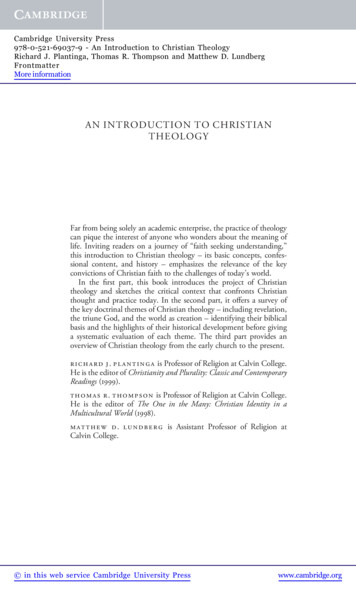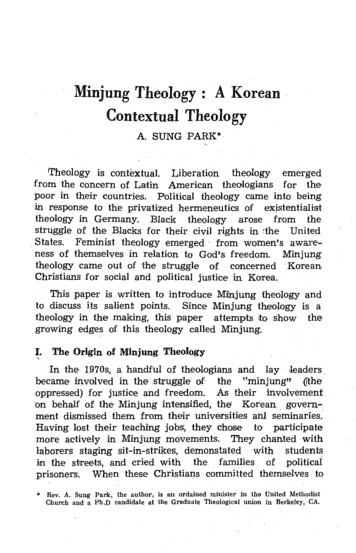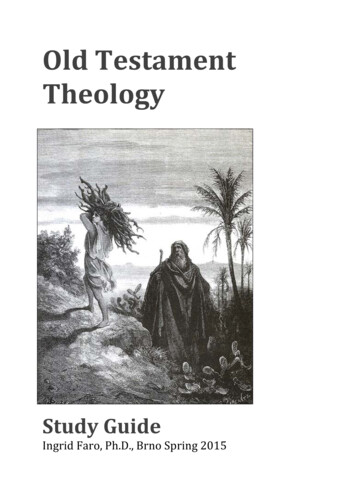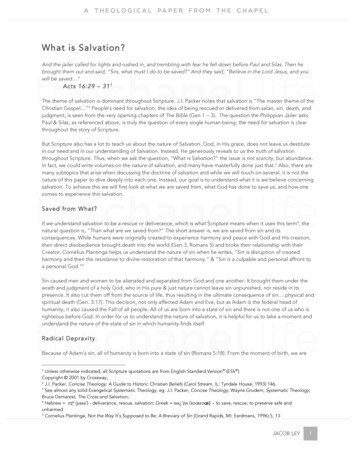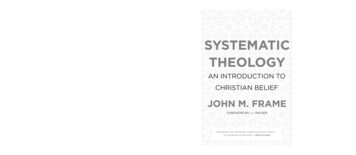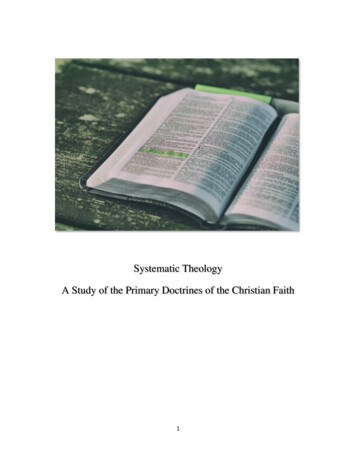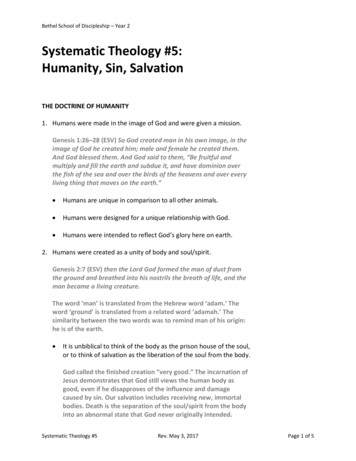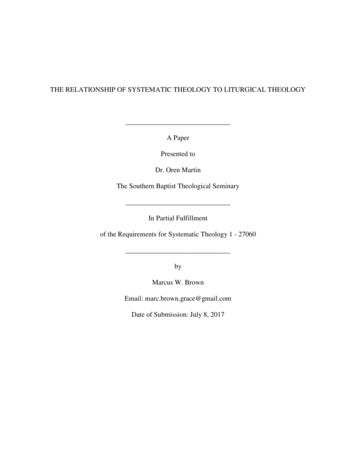
Transcription
THE RELATIONSHIP OF SYSTEMATIC THEOLOGY TO LITURGICAL THEOLOGYA PaperPresented toDr. Oren MartinThe Southern Baptist Theological SeminaryIn Partial Fulfillmentof the Requirements for Systematic Theology 1 - 27060byMarcus W. BrownEmail: marc.brown.grace@gmail.comDate of Submission: July 8, 2017
THE RELATIONSHIP OF SYSTEMATIC THEOLOGY TO LITURGICAL THEOLOGYThe IssueI have always been interested in why there are so many types of theology: systematic,biblical, historical, liturgical, etc. As a pastor who plans and leads worship in the local church, Ihave spent much time pursuing an understanding of liturgical theology. For good reason, manypastors with whom I have served have been more familiar with systematic theology. Do thesedisciplines connect? If so, how do they connect? Or, are these two areas of theological reflectionseparate from each other? To address my questions, the purpose of this paper is to discover anddiscuss the similarities and differences between systematic theology and liturgical theology.Through examining the pertinent texts and lectures material, I will formulate an initialunderstanding of the identity and purpose of systematic theology. Next, I will explore severalopinions as to the definition and purpose of liturgical theology. I will consult ideas from severalliturgical theologians representing different church traditions so that a wider consensus may beattained. Then, I will compare the identifying characteristics gleaned from these opinions to theidentity and purpose of systematic theology. Finally, while providing points of support anddisagreement, I will offer my own understanding on the matter.PositionsMany theologians have attempted to define systematic theology. Some of their definitionsinclude 1) application of God’s Word by persons to every area of life, 2) ordering our wholelives toward God and all things in relation to him, 3) what the whole Bible teaches us today onany given topic, and 4) theology that directs our attention to the realities that the Gospel declares,1
attempting to make those realities known and central to our lives.1 Perhaps the clearest andsimplest definition is posited by Dr. Oren Martin, “Systematic theology is applying the story ofscripture to the story of our lives.”2 Dr. Martin elucidates his definition by providing qualities ofsystematic theology that include 1) being biblical; grounded in the story line of scripture, 2)presenting a worldview that critiques every other rival worldview, and 3) being dialogical,missional, and apologetic.3Systematic Theology expresses itself through a systematized examination of keydoctrines of the faith. These doctrines normally include topics such as God, Scripture,Knowledge of God, Angels and Demons, Man, Christ, the Holy Spirit, the Church, Last Things,and the Christian Life.4 Though each doctrine has its own traditional set of subsets, theologiansmay sometimes divert from the standard approach. An example of this diversion is found inTimothy Ward’s treatment of the doctrine of Scripture, Words of Life: Scripture as the Livingand Active Word of God. As Ward writes, many discussions of the doctrine of Scripture areunder headings such as sufficiency, clarity, and authority.5 However, Ward goes on to say that ashortcoming of this approach is that it can leave the appearance that “Scripture is unrelated to theOren Martin, “Systematic Theology 1“(class lecture Southern Baptist Seminary,Louisville, May 30, 2017).12Ibid.3Ibid.4John M. Frame, Systematic Theology: An Introduction to Christian Belief (Phillipsburg,NJ: P&R Publishing, 2013), vii – ix.5Timothy Ward. Words of Life: Scripture as the Living and Active Word of God.(Downers Grove: Intervarsity Press, 2009), 15.2
great central doctrines of the Christian faith.”6 To remedy this, Ward decides to “articulate,explain, and defend what we are really saying when we proclaim, as we must, that the Bible isGod’s Word. In particular, this is how I want to go about this: I am attempting to describe thenature of the relationship between God and Scripture.”7 Using Ward’s logic, we could say thatone of the goals of systematic theology is to describe doctrines of the Christian church in relationto God and his people. Ward’s process shows that within systematic theology there exists avariety of methods for accomplishing the task of describing or defining Christian doctrines inrelation to God and his people. As demonstrated through the way that liturgy flexibly uses avariety of methods (scripture, prayer, music, preaching, and ritual) to aid worshipers in theirdialogical interaction with God, liturgical theology shows itself to also express this same quality.In Gilles Emery’s systematic theology book, The Trinity: An Introduction to CatholicDoctrine on the Triune God, the translator’s forward compliments Emery’s text as “at everystage (biblical, patristic, and systematic) he pays particular attention to doxology and prayer .”8Emery also defends his articulation of the doctrine of the Trinity in relation to liturgy because, “it(liturgy) occupies such a central place.”9 Between pages 2 and 12 he devotes an entire section tothe significance and necessity of liturgy to the expression of the doctrine of the Trinity,“Concretely, it is through the liturgy that Christians enter into the mystery of God the Trinity and6Timothy Ward. Words of Life: Scripture as the Living and Active Word of God.(Downers Grove: Intervarsity Press, 2009), 15.7Ibid, 13.8Gillies Emery, O.P. The Trinity: An Introduction to the Catholic Doctrine on the TriuneGod. (Washington, D.C: The Catholic University of America Press, 2011), vii.9Ibid, xiv.3
find the light to live out their lives with God. In the liturgy, the Church proclaims the Word thatreveals the mystery of God; she celebrates God and is united to him.”10 Emery’s writing stronglydemonstrates how systematic theology partners with liturgical theology to describe and definethe doctrines of the faith so they can be naturally expressed (worship/liturgy).Some theologians might see liturgical theology as different from other theologicaldisciplines because of its inherent connection to worship practices while not seeing its role in thedevelopment of doctrine. Theologian Geoffrey Wainwright deals with this misunderstandingwhen he asks the question, “What is the role of worship in the relation to the development ofdoctrine?”11 The answer to this question lies most significantly in the concept of lex orandi – lexcredendi, or the way one worships shapes their faith. As protestants, we have inherited the legacyof great reformers who shaped their liturgies according to their faith. We also must understandthat the reason for their liturgical reformation was to shape and express the church’s doctrinethrough that liturgy. As liturgy is intentionally shaped, creating doctrine among the people,liturgical theology seeks the same end as systematic theology – proclaiming the storyline ofScripture in a way that sets the Christian worldview against all other worldviews. TheologianRobert Webber wrote, “Worship (by extension, liturgical theology) proclaims, enacts, and singsGod’s story. Worship is not a program. Nor is worship about me. Worship is a narrative – God’snarrative of the world from its beginning to its end.”12 Theologian Simon Chan continues to10Gillies Emery, O.P. The Trinity: An Introduction to the Catholic Doctrine on theTriune God. (Washington, D.C: The Catholic University of America Press, 2011), 3.11Geoffrey Wainwright, Doxology: The Praise of God in Worship, Doctrine, and Life.(New York: Oxford University Press, 1980), 249.4
dispel the perception that liturgical theology does not contribute to the creation of doctrine,“While we speak of worship as our response (to God’s story), it is strictly speaking not ouraction but the action of Christ in the church The church responds to the God who revealedhimself in history and most supremely in the Word made flesh.”13 If worship is our response toGod, then, as Chan puts it, “we are participating in the God who is truth.”14 Chan calls this“primary theology” because it is an active expression rather than an intellectual or even spiritualassent. In no way was Chan the first theologian to apply the term “primary theology” to liturgy.Several years before Chan expressed his ideas, theologian Aiden Kavanaugh wrote, “I hold thatit (liturgy/worship) is theology being born, theology in the first instance. It is what tradition hascalled theologia prima.”15 A theologian who influenced Kavanaugh’s ideas, AlexanderSchmemann explains, “It is to be sure, faith gives birth to, and shapes liturgy, but it is liturgy,that by fulfilling and expressing faith, ‘bears testimony’ to faith and becomes thus its true andadequate expression and norm: lex orandi est lex credendi.”16Robert E. Webber, Ancient-Future Worship: Proclaiming and Enacting God’sNarrative. (Grand Rapids, MI: Baker Books, 2008), 39-40.1213Simon Chan, Liturgical Theology: The Church as Worshiping Community. (DownersGrove, IL: IVP Academic Press, 2006), 47.14Ibid.15Aiden Kavanaugh. On Liturgical Theology. (New York: Pueblo Publishing Company,1984), 74.16Alexander Schmemann, ed. Thomas Fisch. Liturgy and Tradition: TheologicalReflections of Alexander Schmemann. (Crestwood, NY: St. Vladimir’s Seminary Press, 1990),39.5
SupportThe relationship between systematic theology and liturgical theology is strong and can beobserved through their common features. One such feature can be found in the similar ways bothsystematic theology and liturgical theology define themselves. Using the definitions provided atthe beginning of this paper, we can find these commonalities. A defining feature of systematictheology is that it applies God’s Word to every area of a person’s life, seeks to order the person’swhole life toward God, and help person view all things in relation to God.17 AlexanderSchmemann writes that liturgical theology may begin with finding and defining “the conceptsand categories which are capable of expressing as fully as possible the essential nature of theliturgical experience of the Church,” but it also “connects these ideas with that system ofconcepts which theology uses to expound the faith and doctrine of the Church; and presents theseparate data of liturgical experience as a connected whole, as, in the ‘rule of prayer’ dwellingwithin the Church and determining her ‘rule of faith.’”18 In other words, through the intentionalshaping of liturgy, liturgical theology seeks to experientially apply God’s Word to every area ofa persons’ life.Another evidence of the strong relationship between liturgical and systematic theologiesis observed as both seek to present what the whole Bible teaches us today on any given topic.19For an example of how liturgical theology would embody this goal, Geoffrey Wainwright writesOren Martin, “Systematic Theology 1” (lecture Southern Baptist Seminary, Louisville,May 30, 2017).1718Alexander Schmemann. Introduction to Liturgical Theology. (Crestwood, New York:St. Vladimir’s Seminary Press, 1986), 17.Oren Martin, “Systematic Theology 1“(lecture Southern Baptist Seminary, Louisville,May 30, 2017).196
concerning the public reading of scripture in worship that, “the liturgical distinction betweenGospel and Epistle, together with the fact that readings are taken at the Eucharist from bothcategories in all the traditional rites, indicates that Christianity needs both ‘the story of Jesus’ anda paradigm for the proclamation and application of the message in particular circumstances.”20Through the intentional way that public scripture readings (Old Testament, Psalm, Epistle, andGospel) are selected, whether from a lectionary or in tandem with a pastor’s selected sermontext, liturgical theology is ultimately concerned with presenting what the whole Bible says todayon any given topic. Not only is liturgical theology concerned with what the Bible says on anygiven topic, it is also concerned with how the congregation encounters Scripture. This facetreveals another commonality between liturgical and systematic theologies. Timothy Ward asks,“What, according to the Bible, is in fact going on when God speaks?’ and then answers thequestion, “To say of God that he spoke, and to say of God that he did something, is often one andthe same thing.”21 For Ward, God’s word is equivalent to God acting. Liturgical theology, as itinvolves the modes through which the congregation encounters God’s word through various actsof worship, expresses the same value.Systematic theology attempts to direct our attention to the realities that the Gospeldeclares while attempting to make those realities known and central to our lives.22 Timothy Wardaddresses the way systematic theology supports this goal when he writes that “it has been20Geoffrey Wainwright. Doxology: The Praise of God in Worship, Doctrine, and Life.(New York: Oxford University Press, 1980), 170-171; italics in original.21Timothy Ward. Words of Life: Scripture as the Living and Active Word of God.(Downers Grove: Intervarsity Press, 2009), 20.Oren Martin, “Systematic Theology 1“(lecture Southern Baptist Seminary, Louisville,May 30, 2017).722
common in evangelical writing on Scripture to say that, first of all, Scripture is necessary.”23Ward illuminates this point by quoting John Calvin’s Institutes, “Just as old or bleary-eyed menand those with weak vision, if you thrust before them a most beautiful volume, even if theyrecognize it to be some sort of writing, yet can scarcely construe two words, but with the aid ofspectacles will begin to read distinctly; so Scripture, gathering up the otherwise confusedknowledge of God in our minds, having dispersed our dullness, clearly shows us the true God.”24Just as Ward sees systematic theology as seeking to make scripture central in the lives ofbelievers, Geoffrey Wainwright sees liturgical theology as providing a “hermeneuticalcontinuum”25 that makes scripture centrally applicable to people’s lives. Wainwright makesseveral points to back his claim. First, he writes, “the liturgy has contributed in the most concreteway to the preservation and transmission of the biblical text.” Second, the use of liturgicaltheology sets the “proper atmosphere for the exegete and interpreter” because “the fundamentalmotivation of Christian exegesis and hermeneutics should be doxological.” Third, he states thatliturgical theology “supplies thematic guidelines for the exegete and the interpreter” as it“composes the multiple motifs of the scriptures into a coherent vision.” And finally, “liturgy isthe pre-eminent place in which the Church ponders and applies the scriptures.” Wainwright23Timothy Ward. Words of Life: Scripture as the Living and Active Word of God.(Downers Grove: Intervarsity Press, 2009), 98.Timothy Ward. Words of Life: Scripture as the Living and Active Word of God.(Downers Grove: Intervarsity Press, 2009), 98.24Geoffrey Wainwright. Doxology: The Praise of God in Worship, Doctrine, and Life.(New York: Oxford University Press, 1980), 175.825
explains that this is because liturgy can serve as a “control on the untoward development ofdoctrine.”26Proof of liturgical theology’s kinship to systematic theology is also found through itsbuilding conceptual accounts of God from reasoning. Much of liturgical theology is concernedwith the paradigm, lex orandi, lex credendi, or the way you worship shapes your faith. To thatend, there is a great deal of reason applied to building an ordo (worship order) because it buildsthe congregation’s conceptual understanding of God. Simon Chan makes plain that, “Study ofthe relationship between the lex orandi and the lex credendi has important ramifications forevangelicals today. In whatever way we understand the relationship, belief and worship are soinextricably linked that separation can only undermine the integrity of both doctrine andworship.”27Finally, liturgical theology demonstrates its closeness to systematic theology as itaccompanies systematic theology in reconceiving and enlarging the believer’s understanding ofGod by transposing it to a conceptual idiom so that its unity and interconnections become morevisible to meet the needs of today.28 Aiden Kavanagh formulates, “Liturgy is not ordinary,utilitarian, or for something. Christians do not engage in liturgical worship to get race orinspiration, to indulge in creativity, to become educated in matters ecclesiastical the businessGeoffrey Wainwright. Doxology: The Praise of God in Worship, Doctrine, and Life.(New York: Oxford University Press, 1980), 175-176.2627Simon Chan, Liturgical Theology: The Church as Worshiping Community. (DownersGrove, IL: IVP Academic Press, 2006), 52.Oren Martin, “Systematic Theology 1“(lecture Southern Baptist Seminary, Louisville,May 30, 2017).289
Christians transact in liturgy is festal business because, simply, Christ has conquered death by hisdeath.”29 Kavanaugh describes liturgical theology’s process of enlarging the believer’sunderstanding of God in a way that becomes more visible and meets their needs bydemonstrating liturgy is the ritual of Word made flesh for the life of the world. He alsoestablishes liturgical theology as a promoter of the ministry of reconciliation between God andhis creation.30 Liturgical theology visibly meets the needs of the world today through itscommunal nature. No act of corporate worship is undertaken singularly. “For where two or threeare gathered in my name, there am I among them.” (Matthew 18:20, ESV) As liturgical theologydeals with what happens in the gathered assembly, “the communal nature of the Christian faith isthereby underlined” and the current dynamics of those in the congregation have their needsmet.31ObjectionsOne of the strongest objections against positive comparisons between liturgical theologyand systematic theology comes from a misunderstanding of what liturgical theology is. Manyevangelicals have little or no exposure to liturgical theology. This may be due to the lack ofinclusion for formal courses in liturgical theology courses offered at evangelical colleges andseminaries. For example, there are currently no courses on liturgical theology required for anyMaster of Divinity programs at any of the six Southern Baptist theological seminaries: GatewayAiden Kavanaugh. On Liturgical Theology. (New York: Pueblo Publishing Company,1984), 151-152.2930Aiden Kavanaugh. On Liturgical Theology. (New York: Pueblo Publishing Company,1984), 153Geoffrey Wainwright. Doxology: The Praise of God in Worship, Doctrine, and Life.(New York: Oxford University Press, 1980), 142.1031
Seminary32, Midwestern Baptist Theological Seminary,33 New Orleans Baptist TheologicalSeminary,34 Southeastern Baptist Theological Seminary,35 The Southern Baptist TheologicalSeminary36 or Southwestern Baptist Theological Seminary.37 While there may be many reasonswhy this is the case, the reality is that many evangelicals see liturgical theology as nothing morethan worship planning. Nothing could be further from the truth. As Simon Chan writes, “There isa dialectical relationship between the rule of praying and the rule of belief, between worship anddoctrine liturgy shapes doctrine and doctrine shapes liturgy the development of the doctrineof the Trinity is an example of this dialectical relationship.”38Another challenge some people would have in finding strong similarities betweensystematic theology and liturgical theology is in the practice of most protestants to view worship“2015-2016 Academic Catalog.” Gateway Seminary. Accessed July 7, 229456 -2017 Academic Catalog.” Midwestern Baptist Theological Seminary. AccessedJuly 7, 2017. http://www.mbts.edu/downloads/ current students/seminary catalog 16-17.pdf.33“Graduate Catalog 2017-2018.” New Orleans Baptist Theological Seminary. AccessedJuly 7, 2017. http://www.nobts.edu/ cademic Catalog 2017-2018 Course Descriptions.” Southeastern Baptist TheologicalSeminary. Accessed July 7, 2017. http://catalog.sebts.edu/content.php?catoid 11&navoid 926.35“2016-2017 Academic Catalog.” Southern Baptist Theological Seminary. AccessedJuly 7, 2017. ring-update-v3.pdf.36“2017-2018 Academic Catalog.” Southwestern Baptist Theological Seminary.Accessed July 7, 2017. http://catalog.swbts.edu/.3738Simon Chan, Liturgical Theology: The Church as Worshiping Community. (DownersGrove, IL: IVP Academic Press, 2006), 48-49.11
specifically through the lens of biblical theology. Due to one of worship’s goals of retelling andrehearsing the story of God’s mighty acts of redemption, many theological practitioners wouldliken liturgical theology more to the process of exegetical reasoning found in biblical theologyrather than the dogmatic reasoning of systematic theology. It is true that worship services, likebiblical theology, frequently deal with individual passages or unfolding progressions of scripture,biblical themes, large-scope narratives of salvation and covenantal history, and can proceedinductively from the biblical text. As an academic discipline, liturgical theology is alsoconcerned with forming and presenting dogmatic reasoning, just like systematic theology.Evidence of this can be found in liturgical theology’s desire to apply Scripture to the world. “It isthe Christian community that transmits the vision which the theologian, as an individual humanbeing, has seen and believed. As a believer, the theologian is committed to serving the Christiancommunity in the transmission and spread of the vision among humanity The specific task ofthe theologian lies in the realm of doctrine. He is aiming at a coherent intellectual expression ofthe Christian vision.”39ConclusionThrough examination of the course texts and lectures from Systematic Theology 27060, Ihave gained a basic understanding of the identity and purpose of systematic theology. Usingtexts from several theologians, I have explored opinions on the definition and purpose ofliturgical theology. From these opinions and definitions, I have compared the identifyingcharacteristics of liturgical theology to those of systematic theology. I have provided points ofGeoffrey Wainwright. Doxology: The Praise of God in Worship, Doctrine, and Life.(New York: Oxford University Press, 1980), 3.3912
support and disagreement for those positions. Though the disciplines of liturgical theology andsystematic theology have their differences, I have effectively demonstrated that they share manyof the same qualities and goals. Although liturgical theology is sometimes misunderstood byevangelicals, much of the misunderstanding is due to a lack of exposure. Because of itsimportance helping to accomplish many of the same goals as systematic theology and because itso effectively determines and teaches doctrine to the church, liturgical theology should beconsidered equal in importance to systematic, historical, biblical, practical, philosophical, andother forms of formal theological study in the evangelical academy setting. According toAlexander Schmemann, “All that has been said thus far points to the place liturgical theologymust occupy in the system of theological disciplines In the last analysis they all have the samegoal: the setting forth and explanation of the doctrine of the Church.”4040Alexander Schmemann. Introduction to Liturgical Theology. (Crestwood, New York:St. Vladimir’s Seminary Press, 1986), 18.13
BibliographyChan, Simon. Liturgical Theology: The Church as Worshiping Community. Downers Grove: IVPAcademic Press, 2006.Emery, Gilles, O.P. The Trinity: An Introduction to the Catholic Doctrine on the Triune God.Washington, D.C: The Catholic University of America Press, 2011.Frame, John M. Systematic Theology: An Introduction to Christian Belief. Phillipsburg, NJ: P&RPublishing, 2013.Gateway Seminary. “2015-2016 Academic Catalog.” Accessed July 7, 229456 1498606262 2017-2018-academic-catalog.pdfKavanaugh, Aiden. On Liturgical Theology. New York: Pueblo Publishing Company, 1984.Martin, Oren. “Systematic Theology 1.” Class Lecture, Southern Baptist Seminary, Louisville,May 30, 2017.Midwestern Baptist Theological Seminary. “2016-2017 Academic Catalog.” Accessed July 7,2017. http://www.mbts.edu/downloads/ current students/seminary catalog 16-17.pdf.New Orleans Baptist Theological Seminary. “Graduate Catalog 2017-2018.” Accessed July 7,2017. http://www.nobts.edu/ ann, Alexander. Liturgy and Tradition: Theological Reflections of AlexanderSchmemann. ed. Thomas Fisch, Crestwood, New York: St. Vladimir’s Seminary Press,1990.Schmemann, Alexander. Introduction to Liturgical Theology. Crestwood, New York: St.Vladimir’s Seminary Press, 1986.Southeastern Baptist Theological Seminary. “Academic Catalog 2017-2018 CourseDescriptions.” Accessed July 7, 2017.http://catalog.sebts.edu/content.php?catoid 11&navoid 926.Southern Baptist Theological Seminary. “2016-2017 Academic Catalog.” Accessed July 7, 17-spring-update-v3.pdf.Southwestern Baptist Theological Seminary. “2017-2018 Academic Catalog.” Accessed July 7,2017. http://catalog.swbts.edu/.14
Wainwright, Geoffrey. Doxology: The Praise of God in Worship, Doctrine, and Life. New York:Oxford University Press, 1980.Ward, Timothy. Words of Life: Scripture as the Living and Active Word of God. Downers Grove:InterVarsity Press, 2009.Webber, Robert E. Ancient-Future Worship: Proclaiming and Enacting God’s Narrative. GrandRapids: Baker Books, 2008.15
17 Oren Martin, "Systematic Theology 1" (lecture Southern Baptist Seminary, Louisville, May 30, 2017). 18 Alexander Schmemann. Introduction to Liturgical Theology. (Crestwood, New York: St. Vladimir's Seminary Press, 1986), 17. 19 Oren Martin, "Systematic Theology 1"(lecture Southern Baptist Seminary, Louisville, May 30, 2017).


